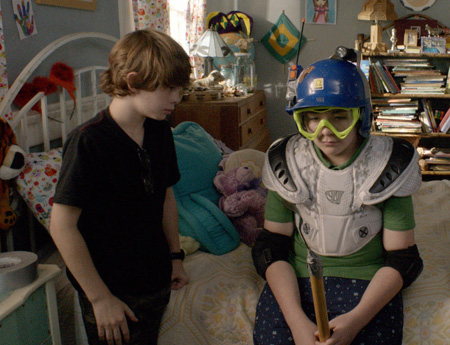Amazon’s Quiet Revolution

The smarter way to stay on top of broadcasting and cable industry. Sign up below
You are now subscribed
Your newsletter sign-up was successful
When Amazon Studios launched in 2010, it promised to fling open the gates to Hollywood and let the rabble in. But Netflix took over the digital-content conversation two years later when it acquired the David Fincher-produced House of Cards and has been building momentum ever since. When the Primetime Emmy nominations came out July 10, Netflix drew 31 nods, more than double its total from 2013. Amazon had none. In an effort to keep up and get back into the conversation, Amazon engineered its most recent new series slate to feature name producers such as Chris Carter, Jason Schwartzman and Michael Connelly. Those boldface talents represent a pivot away from 2010, when Amazon announced a system that would allow anyone, anywhere to upload scripts to be considered for production.
“I certainly hope we didn’t position it that it was going to be online submissions only,” said Amazon Studios director Roy Price—sounding not much like the exec who in a 2011 video said “filmmaking is experiencing a democratic revolution” as stock art of reenactment soldiers firing muskets filled the screen. “That’s not the case.”
And yet, while Amazon has tried to shed its outsider image, it’s left the back door open. At the company’s first TCA press tour presentation July 12, head of comedy Joe Lewis noted Amazon last year produced a pilot, Those Who Can’t, that came through an online submission, and is now in production on a kids series that began the same way.
Digital content companies love to gather data and hate to make said data public—so Amazon declined to specify how many submissions it receives. But company executives insist that every script submitted online is read and that the volume is robust. If that’s the case, Amazon has a valuable if thus far underutilized weapon in its dual mission of establishing itself in the content production business while disrupting said business—a second pipeline to an untapped reserve of talent.
The New Normal
David Anaxagoras held an MFA degree in screenwriting and had never sold a word of his work when Amazon picked up the pilot for Gortimer Gibbon’s Life on Normal Street, his first attempt at a children’s show. Anaxagoras is currently on sabbatical from his job as a preschool teacher while in production on the series’ first season.
As with all Amazon pilots, Gortimer Gibbon’s was posted online for Amazon Prime members to watch, rate and comment on. The feedback informed the company’s decision to order the series.
The smarter way to stay on top of broadcasting and cable industry. Sign up below
“Parents were responding to this show just as enthusiastically as their kids were,” said Tara Sorensen, head of kids’ series development at Amazon Studios. “So I think there’s some really great coviewing opportunities, which I don’t think you see that much.”
Working with an inexperienced creator hasn’t been without challenges. Sorensen noted that “there were maybe more drafts and more sets of notes that went back and forth” than would normally be the case, but nothing problematic. And according to Price, the end product has not suffered.
“I’ve been in the kids TV business for a while,” said Price, whose experience includes a five-year stint as a programming VP at Walt Disney Television Animation, “and Gortimer Gibbon’s is one of the best kids pilots I’ve ever seen.”
Andrew Orvedahl is cocreator of the comedy Those Who Can’t, part of the first round of pilots produced by Amazon in 2013, and the only scripted comedy or drama pilot produced by Amazon thus far to have come through the submission process. While he’s disappointed that the show did not go to series despite positive user ratings, he confirms the experience is “still opening doors” for him long afterwards. And he has not soured on Amazon.
“Netflix is just like a TV network,” Orvedahl said. “They create their programming and that’s it. I think if Amazon can be seen as, ‘this is where you can see [new independent creators],’ it will differentiate them in the long view.”
For a company looking to be a disruptive force, a reputation for identifying talent from outside the usual channels can’t be a bad thing. And, as Netflix proved, it only takes a few shows to build that rep.
“The only thing that matters is how good are the good ones, and they’re good,” Price said of the online submissions. “Occasionally you get one that’s really good and makes it all worthwhile.”
